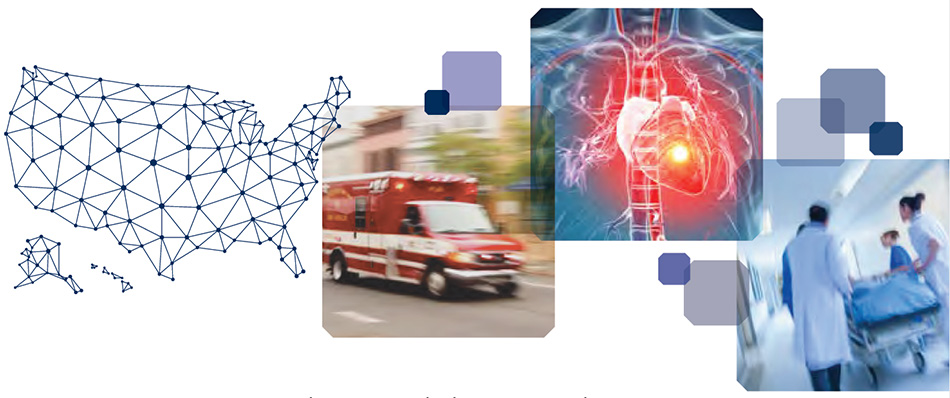Quality Improvement | STEMI ACCELERATOR-2: Intensive Regional Approach Between EMS and Hospitals Results in Better STEMI Care
Emergency medical services (EMS) and hospitals that coordinate emergency cardiovascular care on a regional basis may result in optimized treatment and better outcomes for STEMI patients, according to results of the STEMI ACCELERATOR-2 trial presented at AHA 2017 and simultaneously published in Circulation.
Between April 2015 and March 2017, James G. Jollis, MD, FACC, et al., worked with 12 metropolitan regions across the U.S. to further reduce time to reperfusion and mortality in patients with STEMI. Key elements of the project included pre-hospital activation of catheterization laboratories and bypassing the emergency department when appropriate; pre-specified treatment protocols; measurement and feedback in regional reports; broad regional leadership; and ongoing implementation of quality improvement efforts by a dedicated regional coordinator.
Participating hospitals were enrolled in ACC’s ACTION Registry, from which data was collected quarterly. The study’s primary endpoint was the change, from baseline to final quarter, in the proportion of EMS transported patients with first medical contact to device (FMC2D) time ≤90 minutes.

Over the course of the study period, 10,730 patients were transported by EMS directly to PCI-capable hospitals; 4,546 patients were transferred from hospitals without PCI to PCI-capable ones; and 5,884 patients were self-transported to PCI-capable hospitals.
Of those transported to PCI-capable hospitals, 974 patients received PCI in the baseline quarter and 972 in the final quarter. Between the two quarters, demographic and clinical characteristics were similar. Data showed both the baseline and final quarters had the same symptom onset to first medical contact time (50 minutes).
“There were reductions in every time interval analyzed, reflecting increased coordination between EMS providers, [emergency department] physicians, cardiologists, and catheterization laboratory staff,” the authors explain. “Over the span of less than 18 months, using established methods to organize emergency cardiac care, hundreds of health professionals across the United States collaborated to successfully improve the care of patients with STEMI.”
For example, the proportion of patients with a FMC2D time of ≤90 minutes increased from 67 percent to 74 percent (p < 0.002), while the proportion of those with first medical contact to catheterization laboratory activation of <20 minutes increased from 38 percent to 56 percent (p < 0.0001). The emergency department dwell time of <20 minutes also increased from 33 percent to 43 percent (p < 0.0001). Furthermore, the study authors also noted a decrease in the in-hospital mortality (4.4 percent to 2.3 percent; p = 0.001) and heart failure complications (7.4 percent to 5.0 percent; p = 0.031) among patients brought to PCI-capable hospitals by EMS.
“This small infrastructure added to the significant resources dedicated to cardiovascular care at the individual hospital level has the potential to expedite care and improve outcomes for acute coronary syndrome patients across entire regions,” the authors conclude.
“STEMI Accelerator-2 is the first large-scale study showing striking improvements in multiple treatment times to speed reperfusion for heart attack patients by implementing coordinated regional systems of care in 12 large population metro centers in the U.S. (including New York, Philadelphia, Houston, Las Vegas and Seattle among others). Over the nearly two years of supervision, STEMI in-hospital mortality dropped by nearly one-half and heart failure by one-third. These results will inform, strengthen and promote the guidelines for further implementation of coordinated regional systems of STEMI care in the U.S. and internationally,” says B. Hadley Wilson, MD, FACC.
Clinical Topics: Acute Coronary Syndromes, Heart Failure and Cardiomyopathies, Acute Heart Failure
Keywords: ACC Publications, Cardiology Interventions, Myocardial Infarction, Hospital Mortality, Acute Coronary Syndrome, Quality Improvement, Leadership, Emergency Medical Services, Emergency Service, Hospital, Registries, Clinical Protocols, Heart Failure, Catheterization
< Back to Listings


